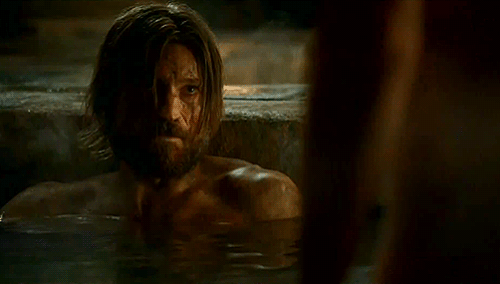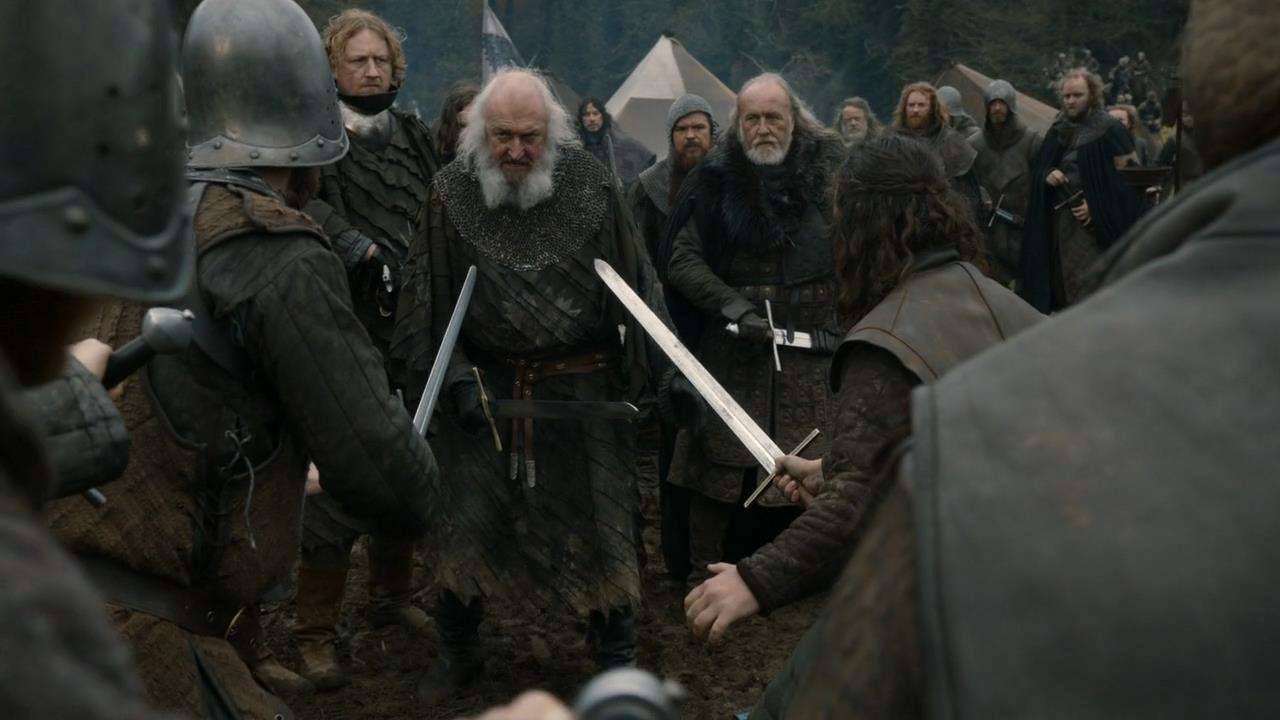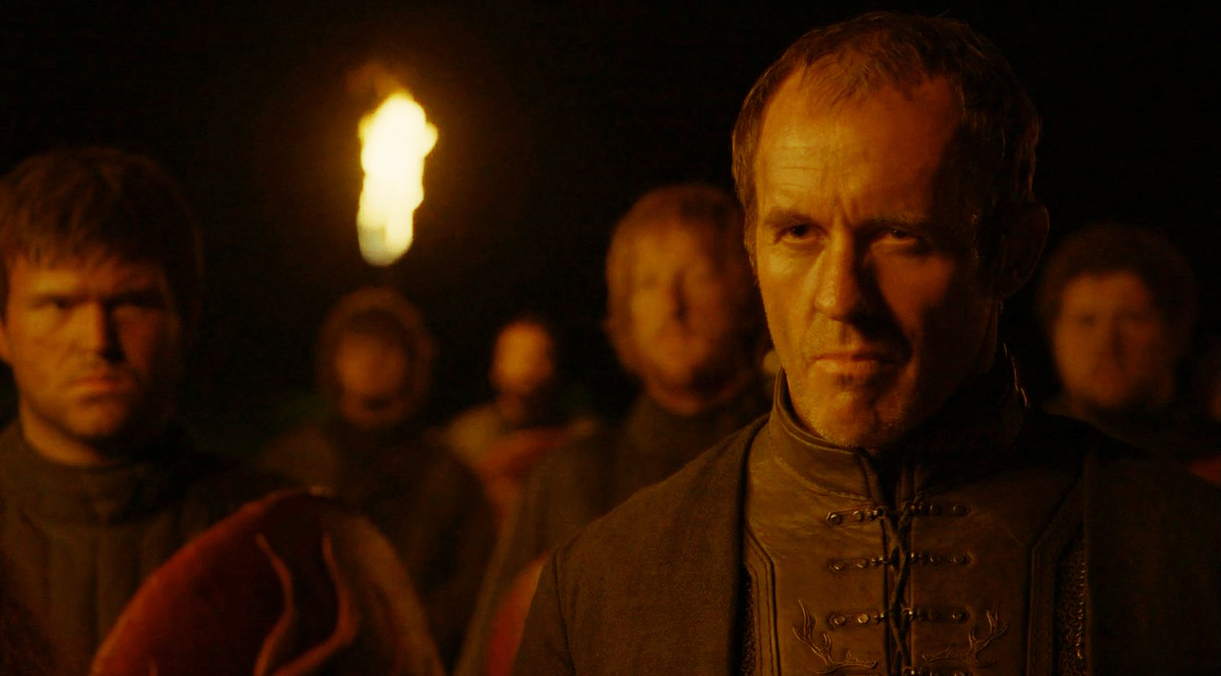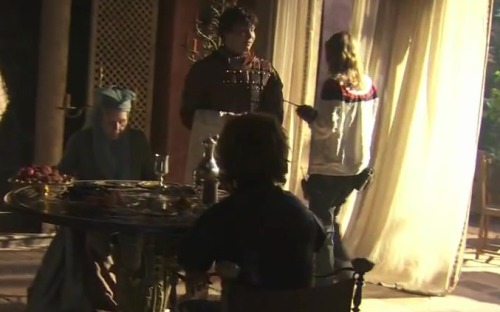The consistent theme of this episode is the difficult choices facing almost all of the characters, from small ones like deciding to get laid for the first time to huge ones like deciding to execute one of your foremost bannermen; from choices with impact in the next few minutes to those that took place almost two decades before. This was an ideal theme for the first halfway point of the season, as it functions as the end of the bridge presented in episode four and we now launch out into the aftereffects that will determine the rest of the road(s). The end of one of those roads was, of course, very heavily foreshadowed and book readers are probably equally anticipating and dreading the moment... but we'll get to that when it happens.
Yunkai made its appearance in the opening credits for the first time. I believe it's also the first time that a city has appeared without the characters actually reaching it. Dany's location was marked by Vaes Dothrak no matter how far away from that place they were for much of season 1, but ordinarily we've only seen a new locale when someone has shown up at the door. Again, great touches by the producers in showing the extent of Valyrian culture throughout the Slaver's Bay communities, as we saw the harpy of Astapor now matched by that of Yunkai, simply with different wings.
The fight scene was everything I'd hoped for and presented the first of those tough choices; always happening when you're letting some god make decisions that affect the real world ("for good people to do bad things takes religion" and all that.) Arya's anguish was evident and only furthered when Gendry later informs her that he's staying with the Brotherhood. One thing that occurred to me as they focused upon Arya's observing the duel was whether she was so intent out of her desire to see her preferred outcome or if she was actually watching (and critiquing) the swordplay, hearkening back to her training with Syrio. It's what I was doing... But when you've sworn a vow to kill someone, that will usually override the finer points.
However, making a promise or a vow is often easy. Maintaining it is the trick. That was never more obvious than in the two most poignant scenes of the episode, involving Jon with Ygritte and Jaime with Brienne (The two most poignant scenes also involved naked people, allowing the Interwebs to continue to serve their main functions: Twitter and pr0n.)
A vow of celibacy is easy to declare, but priests throughout the ages are a testament as to how difficult it is to keep. In the case of being a young man who's already disappointed with the outcome of his life to date and is confronted with a blazing hot redhead dropping her kit, it's basically impossible for any human and there are few more human characters in the story than one Jon Snow. The interesting thing about that union is the fact that Ygritte is still technically the enemy for a member of the Watch attempting to be the inside man. On the other hand, Jon has been discarded by the Southerners simply because of the conditions of his birth. In a way, he's as much a Wildling as any of the people he's supposedly working against. But it's certainly something that has to wander through his mind as soon as the blood flows back from one head to the other and it's something that plays out in the books fairly prominently in the character's thoughts. It will be interesting to see how Kit Harrington plays it.
But the best scene by far and one which should earn Nikolai Coster-Waldau much award consideration is Jaime's soliloquy in the bathtub about the choices he made 17 years ago that earned him the scorn of an entire continent for being an oathbreaker. The Kingsguard are obligated to serve for life and to follow every command of the king. As the only member of the guard privy to Aerys' mad ramblings about vengeance and arson, Jaime was placed in a unique situation. By any common assessment of ethics, the choice was to stop the deaths of thousands (and his own father.) This is the same assessment made at Nuremberg, in which claiming that one was simply following orders was deemed insufficient. Drawing the contrast with Ned Stark, who is widely considered one of the few "good guys" in the story but whom also saw things in a very black-and-white perspective, is the key element to Jaime's confession. He was judged by one of the heroes of the revolt and was tarred with the actions of his family (the sack of Kings' Landing and the murder of the Targaryen children), despite the fact that his choices saved not only Lannisters but thousands of smallfolk.
Just as interesting is Robb's struggle with those same ethics that his father handed down to him and which put him in as difficult a situation as his father often faced: Justice says that Rickard Karstark needed to die for betraying his king. Strategy says that you shouldn't alienate half your army. What's different about Robb's moment is that he had multiple advisers (unlike his father), from his intelligent wife to his impulsive uncle, telling him to do the 'right' thing for the war and not for rules that people will tend to abandon in wartime. Ned Stark, of course, never would have.
Sometimes those difficult choices extend to script writers and actors, too. As I've mentioned before, I'm not particularly thrilled with Stephen Dillane's depiction of Stannis this season. While he becomes surly and even more irascible after the defeat at Blackwater in the books, he remains implacable Stannis. Dillane is showing the anguish of the character in dealing with his wife and daughter locked in the tower at Dragonstone, which certainly humanizes Stannis and probably enables more people to relate to him... but the point of the character is that he's essentially not human and lives life by being driven by his goals. (This is the same reason the V for Vendetta film failed; the cipher isn't supposed to have individual motivations.) But, of course, playing Stannis from the books wouldn't allow Dillane to do much, even though his performance as Thomas Jefferson in John Adams was rather diffident and that was what made it really brilliant. In that same vein, in the best moment in the series for Michael McElhatton as Roose Bolton, he again simply doesn't convey the eerieness that makes the character what he is. I'm still hoping for a Leech Lord scene, but honestly wouldn't be surprised if they simply did away with that aspect at this point.
And while Davos looked way too good for a man who'd been confined to a cell on what is essentially a volcanic island, it has to be said that the scene of Shireen attempting to teach him how to read was really sweet. Daenerys' material this week was a bit of an afterthought, except to again carry the theme of difficult choices in the discussion between Mormont and Selmy about whom was the real loyal servant and whom was the past traitor and so on. Dany's object lesson in what names mean was more of a learning exercise in leadership than anything else and continues her development as a queen while taking a moment to introduce Grey Worm.
But we come right back around to theme in the final scene, when Tywin lays the law down to the kids as to how he's going to reorganize Westeros for the supremacy of the family and the security of the kingdom. Charles Dance kills it in this scene and Cersei is once again switched from queen to pawn before she can even think of a defense. So, now the choice for both her and Tyrion becomes: Do I do what daddy said or risk his wrath?
Lines of the week:
"What happens to your eagle after I kill you? Does he drift away like a kite with its strings cut or does he just flop on the ground?" Jon with a decent question about wargs while trying to show his false(?) loyalty.
"You swore some vows. I want you to break'em."
"We shouldn't."
"We should."
Jon and Ygritte, doing what comes naturally, unhindered by this whole "civilization" thing.
"There will be pain."
"I'll scream."
"Quite a bit of pain."
"I'll scream loudly."
Jaime, the bitter warrior, and Qyburn, the fallen maester, discussing the reality of medieval medicine.
"This one was the watcher. Hang him last so he can watch the others." Robb doing it Solomon-style.
"There's the look. I've seen it for 17 years. You all despise me. Kingslayer. Oathbreaker." This was the opening to Jaime's fantastic speech. The ending moment was even better when Brienne, seeming to understand and sympathize, still cries out for help for "The Kingslayer!" and he responds: "Jaime. My name's Jaime."









No comments:
Post a Comment
Note: Only a member of this blog may post a comment.